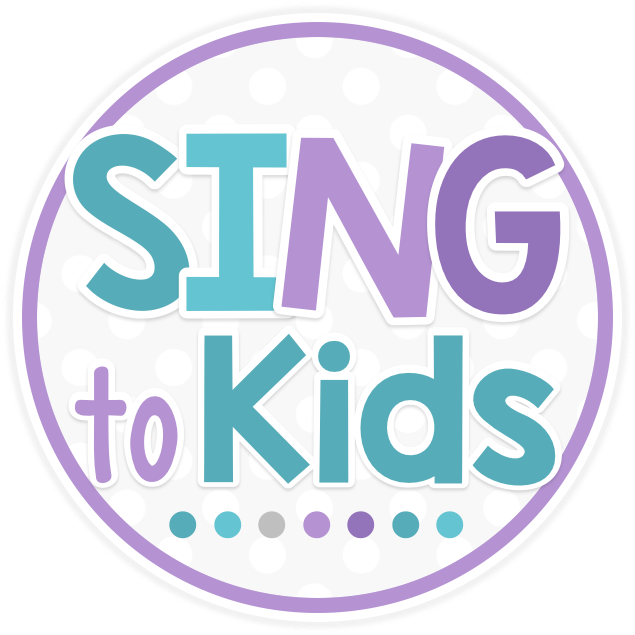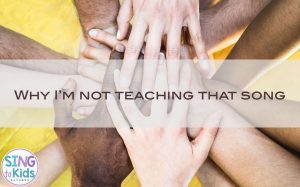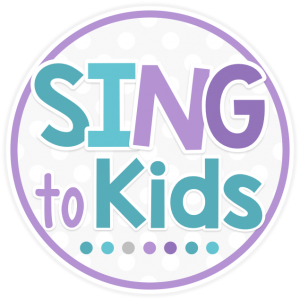Full Disclaimer
This post has been brewing in my mind for a while, but I’ve struggled to put it together. Talking about racism is never comfortable, but the reality is these are hard conversations that need to be had. And to be brutally honest, the work needs to be done by white educators. In sharing my process, it is not my intention to center the conversation about race around myself. I hope in sharing my journey with others, it will encourage you to wrestle with your own biases and implicit racism so that you can be a better educator and ally for your black students.
Background
Three years ago, I was preparing for our winter sing-along. The Decolonizing the Music Room movement was under way. Groups like FAME were beginning to openly wrestle with songs rooted in racism. Jingle Bells was one of those songs identified as problematic. I had already begun teaching it to classes because it was a song that didn’t center on holidays and the majority of my students knew and enjoyed the song. As I began to research the song deeper, I came to understand that Jingle Bells became popular because it was performed in minstrel shows and that the composer, James Pierpont, supported the Confederacy. Upon learning this, I had to make a choice whether to continue singing the song in class or pull the song. I chose to continue to use the song this final time because I didn’t think my students would know the history nor be affected by it.
Fast forward a week or two, I’m teaching a first grade music class and we’re reviewing the song for the the sing-along. The sweetest little African-American girl quietly raised her hand. I called on her and she said: “My Papa told me this song is racist.”
Owning It
I was convicted on the spot. I knew the history of the song and composer and I made a conscious decision to continue using it because I “thought” my students wouldn’t know the history as well. I was wrong and I had to own it in the moment. That was the last time we sang Jingle Bells.
So what did I do? I made amends. I apologized to the 6-year old and the rest of the class and then we talked about why we couldn’t sing the song anymore. The conversation went like this: “If you knew a song was written or performed to hurt or make fun of others, would you want to continue to sing it?” The entire class said no. “If that’s the case, then we have to stop singing this song. I made a mistake by choosing this song and now that I know better, I want to do better. I’m very sorry it was hurtful to one of my students. I hope you can forgive me.” What the conversation did not include was a lengthy explanation of why the song was problematic, rather it was an age-appropriate conversation and modeled that adults can own their mistakes as well.
Self-Reflection
What I learned in that day was that I, a white educator, assumed my African-American students didn’t know their own history. That belief was rooted in racism, whether I wanted to admit it or not. What I’ve come to understand is the brilliance of my African-American students. Our students know the history taught in school and the history that has been left out of the textbooks. They learn to code switch to function both at school and at home. Our black students know which teachers are allies and those who are not. I thought I was an ally but my actions showed otherwise. I had to spend time reflecting upon my practice to ensure that my beliefs, words and actions were one in the same.
Where to Begin
So if you are just starting this journey, what can you do?
- Become knowledgeable about the history of the repertoire you use in your music classroom. FAME has an active list of problematic songs with citations of songs with problematic history (racism, appropriation, and/or mature content). UNC also has a website dedicated to anti-racist resources for music education.
- When you know better, do better. I know many of us grew up with memories of singing certain songs but that is not an excuse to continue to perpetuate them. There are so many songs to choose from to teach any and every musical concept. Use this as a growth mindset opportunity to learn new repertoire.
- Seek out your own professional development to help you grow as an educator.
- Decolonizing the Music Room is a Facebook group and is a fabulous place to learn and be challenged around race and LGBTQIA issues.
- Missy Strong has been doing some fabulous work sharing her journey on both her FB page, Music Ed with Missy, and her podcast, Music Ed Amplified. (I especially love the episode with Jasmine Fripp.)
- Follow and elevate other black educators (music as well as other subjects). Lean in and listen to their stories and what they have to say. Believe them when they speak their truths. Some of my favorites to follow on IG are Charissa Duncan, Franklin Willis, and Vera Ahiyya (this is not a comprehensive list!)
- Be an ally in your words and actions. We’re so good with words but our actions… Who are you really disciplining in your room? Who are you really frustrated with in your room? Who are you lifting up in your class? Why? If black children come to mind then you need to do some self-reflection about your biases. Challenge yourself to build connections and relationships with your children of color.
- Don’t center yourself in conversations about race and privilege. If you find yourself feeling attacked or defensive, then get quiet and ask the question why? Take a moment to explore why you feel this way. Humble yourself to acknowledge your privilege and how social constructs impact all people.
I don’t pretend to be an expert in any of this. I’m simply sharing my own journey to becoming a better teacher and ally for my black students. I hope in being honest and transparent that it may help inspire you to do your own work.
Related Blog Posts
My friend, Elizabeth Caldwell, from Organized Chaos, has done some phenomenal work with Anti-Racist and Restorative Practices in the music room. Check out some of her blog posts here:
Restorative Practice in the Music Room




This is such a phenomenal article. I love how you kept the conversation on an age-appropriate level and also demonstrated that everyone makes mistakes. I appreciate the way you dealt with and shared this challenging topic.
I appreciate your article and bringing this matter to the attention of your readers. I have made the same decision to sing some of those traditional songs for the same reason, I Just have had no students question the process yet. I imagine it is only a matter of time. I need to make the decision to start revamping the repertoire I teach in my class to make sure that all students are comfortable and no one is hurt in the process. Thank you for sharing.
Jingle Bells is a racist song ?What a reach! There is such an effort to destroy America and all of its history and traditions that is irrational. Teachers like this along with the attempt to intervene in parental rights are exactly why we will homeschool our child.
You will not find a single child that believes this song to be racist unless programed by some twisted adult.
Hi Michael! Thank you so much for your response. I’m happy to have dialogue with you about this further. I’m wondering what “history” you are referring to that is being destroyed? The history that has been white-washed over time that excludes the harm caused to indigenous and enslaved people? Or the history that has excluded the contributions and accomplishments of African-American, Mexican-American, and other marginalized groups? Jingle Bells was made popular when it was performed in minstrel shows, where performers in Black face performed to mock African-Americans. James Pierpoint, the composer, served as a Confederate soldier. Jingle Bells, in and of itself, may not be a “racist” song, but you are mistaken if you think that our Black children and families do not know the origins of the song. And when we, educators, uphold certain songs and traditions that have their roots in racism, we are in essence telling our students that we are not safe, nor an ally to them. As the parent of a Black child, it is important to me that we explore the truth of our history. In doing so, only then can we begin to heal. If you find that twisted, so be it. I wish you well!